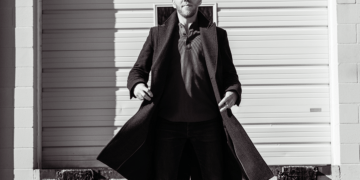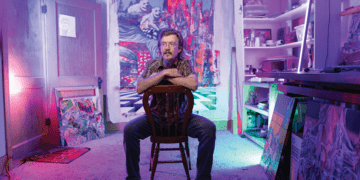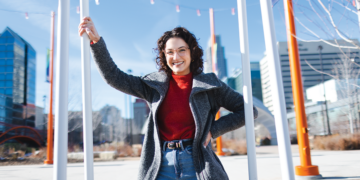In the hands of an Omaha artist, quilts, beds, and chairs weave a narrative beyond their functional existence. They represent a familiar intersection of personal comfort and accommodation for Shelby Seier, a disabled and chronically-ill visual artist and access worker.
Seier sketches beds and chairs adorned with quilts and repurposes old bedsheets into intricate improvisational quilts, which she creates without intentional designs, instead allowing the concept to inform the work. The artist finds inspiration in her own disabilities, particularly neuroimmune axis disorder and dysautonomia, which serve as the primary guiding muses for her creations. They shape and influence every stitch, sketch, and advocacy effort that she undertakes.
“Textiles, especially quilts, are things that protect us and comfort us,” Seier explained. Her affinity for chairs and beds—essential accommodations in her life due to chronic illness—melds seamlessly with her artistic expression. For someone spending substantial time in bed due to disabilities, these objects of rest transcend their utilitarian purpose as Seier transforms them into vibrant expressions of comfort and beauty.
“Fatigue and chronic illness affect my artistic process,” Seier admitted. Her artistic timeline is unconventional, a result of navigating the barriers imposed by her own disabilities.
Upon earning a theater degree, Seier committed herself to artistic pursuit until her disabilities hindered her continued engagement. She transitioned into the world of improvisational comedy for a more flexible method of creative expression.
Exploring a new artistic avenue, Seier then embraced improvisational quilting in 2021. Inspired by quilts on eBay, she also sketched them to immortalize their beauty. Her intuitive understanding of sewing techniques, passed down from her skilled seamstress grandmother, JoAnn, honed her abilities. This journey spurred her to uncover the roots of the tradition in African American culture, drawing insights from resources like the International Quilt Museum in Lincoln.
“Improvisational quilting is a slight deviation from my heritage, yet it honors my lineages, and I’ve made the practice my own by using my artistic backgrounds to inform my fiber arts practice,” Seier said. “I sew without a plan and let the fabrics speak to me; they tell me where they should go.”
Still, the barriers of chronic pain coupled with chronic fatigue limit the hours the artist can dedicate to her work. “I have yet to make a full-sized quilt,” Seier noted. “Instead, I make quilt blocks and quilt tops, [but] my outputs are decreased due to energetic depletion.
“When I am able to create, I really savor it. Creating a quilt that couldn’t be created by a machine means a lot, because it reflects my imperfections and my inability to perform at a certain level.”
Employing ledger paper for her drawings of chairs and beds is also deliberate; she juxtaposes these objects of rest on a medium often associated with productivity and finance, an intentional contrast that signifies her relationship with productivity as a disabled person experiencing time differently.
“When I sit in a chair in public, I experience so much relief,” Seier reflected. “[T]here’s a huge gratitude toward these objects…they’ve enhanced my life, and I honor them in that way.”
Seier is well-acquainted with limitations encountered by disabled people, as well as the relief that arises upon entering a space that prioritizes inclusion efforts. That’s why her own endeavors aren’t just about creation; they’re also a means for advocacy. In 2019, Seier founded All Kinds Accessibility Consulting, which practices accessibility as an art form and offers resources and accommodations that go above and beyond what is legally mandated—the bare minimum, she emphasized.
“I want to normalize disabled people being in public and having access to the things that non-disabled people take for granted,” Seier affirmed. “In my experience, disability is really neutral and at best is just kind of boring; it’s just another part of me that is informative and sometimes joyful and wonderful.”
Kelsey Celek, Affiliate Relations Manager for Destination Imagination in Dayton, Ohio, and Seier’s current client, echoed the value of Seier’s work with All Kinds. “[Seier] comes to advocacy work with a wealth of experiences, both professional and personal, which she shares with openness and vulnerability,” Celek shared. “Working with Shelby has been an important milestone in my organization’s progress toward inclusion.
“The warmth and enthusiasm she brings to her advocacy work is infectious; she makes those around her feel empowered to become champions for accessibility, too.”
Seier perceives the art community’s adoption of accessibility as essential, urging organizations to consider beyond mere physical accommodations and implement more thoughtful solutions.
“Disabled people have to spend a lot of time researching whether or not a program, opportunity, event, or otherwise will meet their needs,” Seier explained, “and a lot of times, the accessibility begins and ends with information for wheelchair users—and that’s absolutely vital—but the disability experience is so much more than ASL interpreters and wheelchair access.”
Completing a full quilt and securing an artist residency slot both loom on Seier’s artistic horizon. Her advocacy plans call for a world where creativity knows no barriers, where art and accommodation merge effortlessly, and where inclusivity is the cornerstone of every canvas and stage.
“We create [resources] at All Kinds, and we hear great feedback about [disabled people] feeling comfortable leaving their house to go to an event and then feeling excited to be welcomed into the community,” Seier said. “There’s a solution for nearly everything and there’s no excuse for not including people with disabilities into any program or space.”
For more information, visit allkindsaccessibility.com. Follow Seier’s work on Instagram
@shelbyseier and @allkindsaccessibility.
This article originally appeared in the March/April 2024 issue of Omaha Magazine. To subscribe, click here.
This article originally appeared in the March/April 2024 issue of Omaha Magazine. To subscribe, click here.













